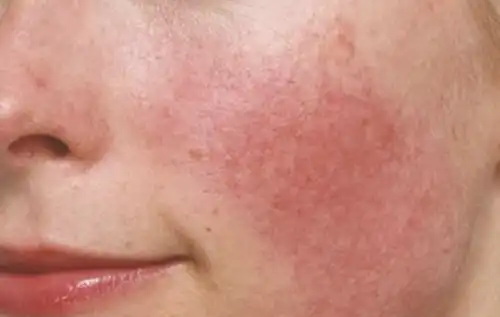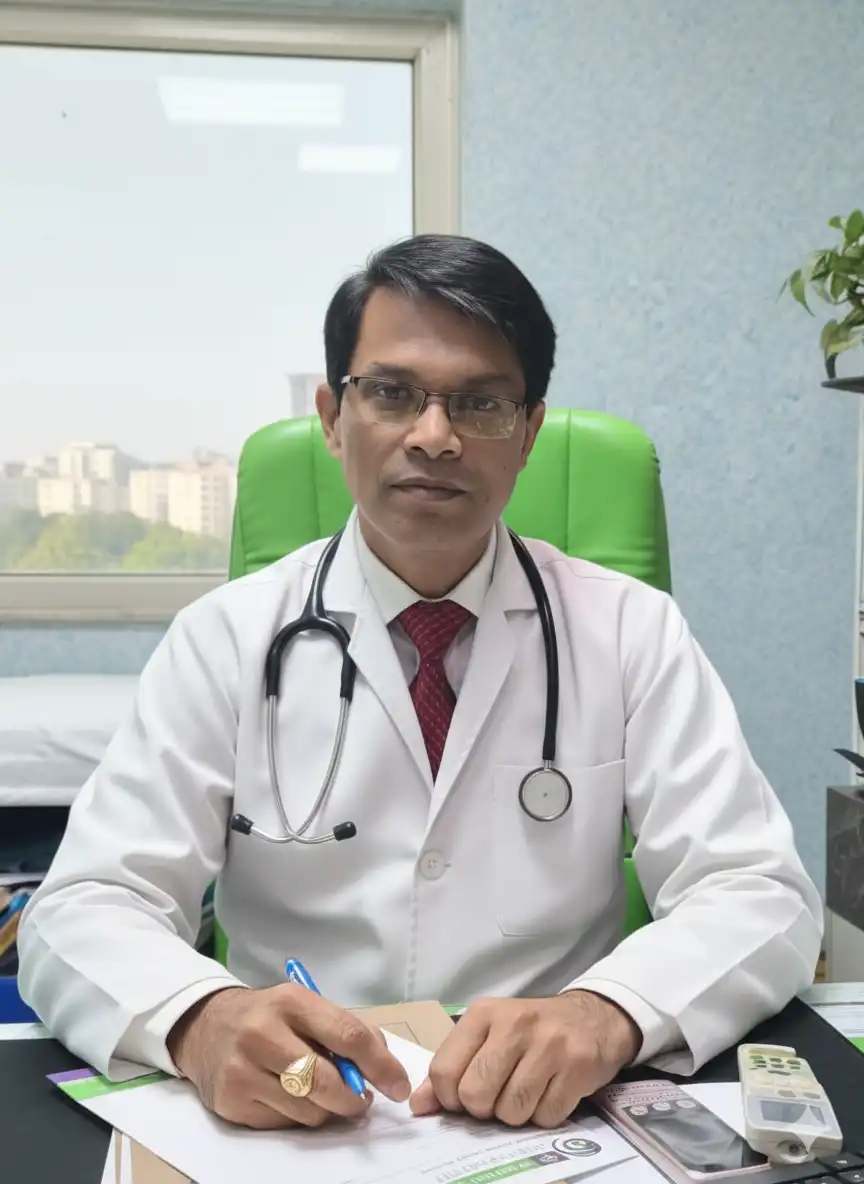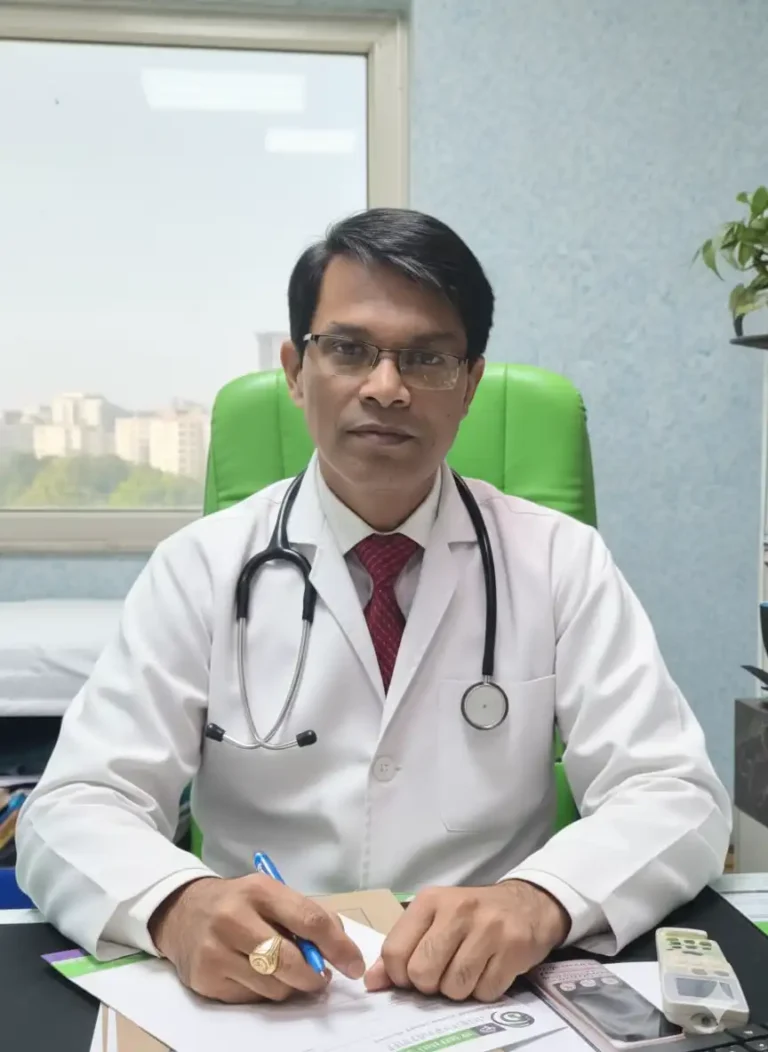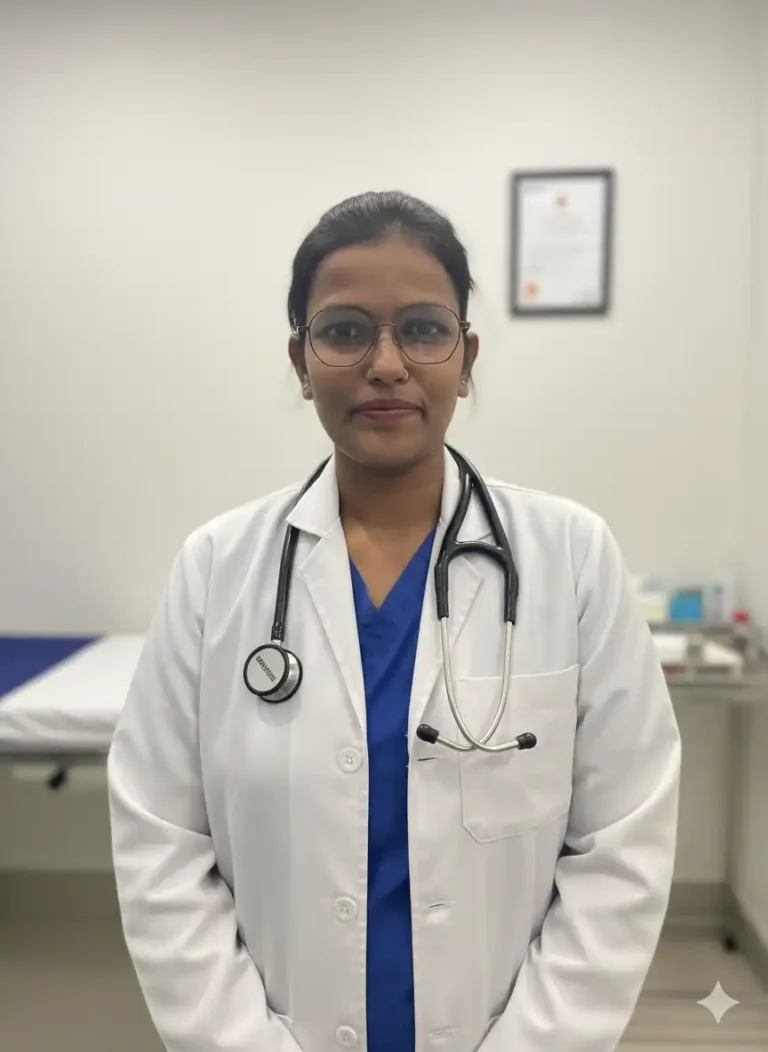
What is Rosacea?
Rosacea is a long-term skin condition that mainly affects the face. It causes persistent redness, frequent flushing, and small visible blood vessels. Many people also develop acne-like bumps without blackheads. The cheeks, nose, forehead, and chin are most commonly affected. In some cases, the eyes may also be involved, leading to irritation, burning, or watery eyes (ocular rosacea).

Key points:
- Chronic but manageable condition
- Not contagious
- More common in adults aged 30–50
- Early treatment prevents complications like thickened skin (rhinophyma)
What are the early Signs and Symptoms of Rosacea?
Rosacea often begins with mild symptoms that worsen over time if untreated. The earliest sign is frequent blushing or flushing, especially on the face. This redness gradually becomes permanent in areas like the cheeks and nose. Small blood vessels may become visible, and the skin often feels sensitive.
Early warning signs:
- Persistent redness on face
- Flushing or blushing easily
- Visible tiny blood vessels
- Acne-like bumps (without blackheads)
- Burning or stinging sensation
- Eye irritation (watery or dry eyes)
What are the stages of Rosacea?
Rosacea often progresses in stages if not managed early. Symptoms may start mild but become more noticeable with time. Recognising the stage helps in choosing the right treatment.
Stages include:
- Stage 1: Flushing and temporary redness
- Stage 2: Persistent redness, visible blood vessels
- Stage 3: Acne-like bumps, papules, pustules
- Stage 4: Thickened skin, especially on the nose (rhinophyma)
- Ocular stage: Eye irritation, burning, redness
Not everyone progresses through all stages, and treatment can slow or stop worsening.
What causes Rosacea on the face?
The exact cause of rosacea is not fully known, but doctors believe it is linked to a combination of immune system reactions, genetics, and environmental factors. Abnormal blood vessels in the skin may cause redness and flushing. Some patients have higher numbers of skin mites (Demodex), which worsen inflammation.
Possible causes/triggers:
- Overactive immune response
- Abnormal blood vessel function
- Genetic predisposition
- Skin mites (Demodex)
- Environmental factors like heat, sunlight, alcohol, spicy food
Is Rosacea the same as acne?
Rosacea and acne may look similar but are different skin conditions. Acne commonly affects teenagers and young adults, while rosacea usually appears after age 30. Acne includes blackheads, whiteheads, and oily skin, which are not seen in rosacea.
Differences:
- Rosacea: redness, flushing, blood vessels, eye symptoms possible
- Acne: blackheads, whiteheads, clogged pores, no eye involvement
- Rosacea skin is often sensitive, while acne-prone skin is usually oily
A dermatologist can help distinguish between the two and provide correct treatment.
What foods should be avoided in Rosacea?
Diet plays an important role in controlling rosacea. Certain foods and drinks can trigger flare-ups by increasing blood flow to the skin or irritating sensitive tissues. Keeping a food diary helps identify personal triggers.
Common foods to avoid:
- Spicy foods (chilli, hot curries)
- Alcohol (especially red wine)
- Caffeinated drinks (coffee, tea)
- Very hot beverages
- Aged cheeses and processed meats
- Chocolate and sugary foods
Instead, choose a balanced diet with fresh fruits, vegetables, whole grains, and hydration, which supports healthier skin.
How can I reduce redness from Rosacea naturally?
Rosacea redness can be managed naturally by adopting a gentle skincare routine and lifestyle habits. Natural remedies do not cure rosacea but may help reduce flare-ups.
Helpful natural steps:
- Use mild, fragrance-free cleansers
- Apply sunscreen daily to protect sensitive skin
- Keep the face cool—avoid heat exposure
- Eat anti-inflammatory foods (green leafy vegetables, omega-3 rich foods)
- Stay hydrated and manage stress
- Apply cold compresses during flare-ups
Avoid harsh scrubs or strong cosmetics, as they may worsen redness. Natural care works best when combined with medical guidance.
Can Rosacea affect the eyes?
Yes, rosacea can involve the eyes, a condition known as ocular rosacea. This causes irritation, dryness, burning, and redness in the eyes. Some patients may feel as if something is stuck inside the eye. If untreated, it can lead to more serious problems affecting vision.
Eye symptoms include:
- Red, watery, or bloodshot eyes
- Burning or stinging sensation
- Sensitivity to light
- Swollen eyelids
- Blurry vision (in severe cases)
Eye involvement needs early medical attention, as proper treatment helps prevent long-term complications.
What skincare is safe for Rosacea?
People with rosacea should use gentle, non-irritating skincare products to avoid flare-ups. Harsh chemicals or scrubs can worsen redness and sensitivity. A consistent skincare routine helps keep the skin calm and healthy.
Safe skincare tips:
- Use mild, fragrance-free cleansers
- Apply alcohol-free moisturizers to prevent dryness
- Always use sunscreen (SPF 30 or higher, mineral-based)
- Avoid scrubs, exfoliants, or chemical peels
- Choose makeup labeled “non-comedogenic” and “for sensitive skin”
- Wash with lukewarm, not hot, water
Gentle care prevents irritation and supports medical treatment.
Can Rosacea get worse with age?
Yes, rosacea may gradually worsen with age if not properly managed. Early symptoms like flushing and mild redness can progress into persistent redness, bumps, and visible blood vessels. Some people may even develop thickened skin on the nose (rhinophyma). However, with correct treatment and lifestyle changes, rosacea can be controlled at any stage.
Key points:
- Without treatment, rosacea often worsens
- Flare-ups become more frequent with age
- Early diagnosis prevents long-term damage
- Proper skincare and trigger avoidance keep symptoms mild
Is Rosacea more common in men or women?
Rosacea is more common in women, especially between the ages of 30 and 50. However, men who develop rosacea often have more severe symptoms, such as skin thickening on the nose (rhinophyma).
Gender-related facts:
- Women: more frequently diagnosed, milder symptoms
- Men: less common, but more severe cases
- Both genders can experience eye involvement (ocular rosacea)
- Hormonal factors may explain higher female incidence
Rosacea affects both men and women, but severity varies.
Can Rosacea damage the skin permanently?
Yes, untreated rosacea can lead to permanent skin changes. Long-standing redness, visible blood vessels, and thickened skin may remain if treatment is delayed. Rhinophyma (enlarged, bulbous nose) is an advanced complication, mostly in men.
Potential long-term effects:
- Persistent redness
- Enlarged pores
- Visible blood vessels
- Thickened or bumpy skin texture
- Eye damage in ocular rosacea
Early treatment prevents permanent damage and improves confidence.
Rosacea Treatment with Homoeopathy
Homoeopathy offers a gentle, individualized approach to managing rosacea. Instead of just reducing redness temporarily, it works on the root cause — balancing the body’s immune response and reducing sensitivity to triggers. Medicines are selected based on the patient’s symptoms, constitution, and history, making the treatment highly personalized.
Benefits of Homoeopathic Treatment:
- Safe and natural, without side effects
- Reduces frequency and intensity of flare-ups
- Improves skin texture and sensitivity
- Addresses associated complaints like burning, stinging, or eye irritation
- Long-term control, not just short-term relief
Commonly used medicines (individualized to patient):
- Belladonna – for sudden flushing and burning redness
- Sulphur – for persistent redness and heat in the face
- Pulsatilla – when symptoms are worse in warmth and better in cool air
- Natrum muriaticum – for facial redness linked to emotions and sun exposure
- Carbo vegetabilis – for visible veins and sensitive skin
Treatment always requires consultation with a qualified homoeopathic doctor for the most suitable remedy.
Why choose Dr. Sanjay’s Homoeopathy for Rosacea Treatment in Lucknow, India?
Dr. Sanjay’s Homoeopathy is a trusted destination for safe and effective rosacea treatment in Lucknow, India. With years of expertise, Dr. Sanjay provides specialised rosacea homoeopathic treatment that helps reduce facial redness, burning sensations, visible blood vessels, and flare-ups naturally without side effects. As a leading homoeopathic doctor in Lucknow, he follows international treatment standards and offers personalized care that addresses the root cause of rosacea while improving overall skin health. Patients choose Dr. Sanjay’s Homoeopathy for its holistic healing, proven results, and compassionate approach to managing chronic skin conditions like rosacea.


